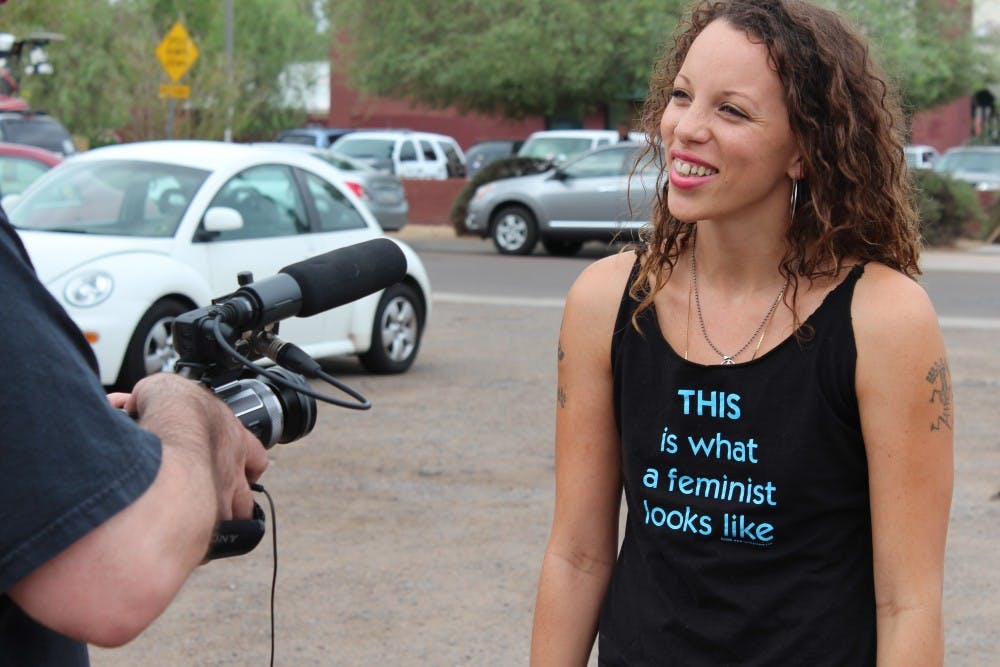Jenna Duffy walked down Mill Avenue on Sunday, megaphone in hand, leading a small group of people behind her. She and her followers were completely topless, except for pieces of tape covering their nipples.
Some held signs boldly stating, “My nipples are not a crime” or “Free Your T--ies, Free Your Mind”, and a woman hoisted her bra above her head in defiance.
“What do we want?” yelled Duffy into her megaphone, followed by an echo of "Topless rights!"
The march was one of 51 topless rallies occurring throughout the world. As an annual event founded in 2007, “Go Topless Day” is held on the closest Sunday from Aug. 26 – Women’s Equality Day and the anniversary of the 19th Amendment, which gave women the right to vote.
A group of about 20 women and male supporters arrived Sunday morning to take off their shirts and march from the Tempe Farmers Market to Mill Avenue.
Duffy, the Arizona organizer for Go Topless, said the current Arizona law prohibiting women from showing their areolae or nipples in public is unacceptable.
“It really shows that rights between women and men are unequal," Duffy said. "A man can take off his shirt and nothing will happen. I take mine off, and I get arrested. To me, that’s significant."
To keep the protest legal, attendees had to wear a thin layer of tape across their nipples. Although not legally required, men did the same to visually display the current inequality.
Protester Tony Patton attended the march with his wife.
“Women should have the same rights as men,” he said. “Women are earning livings and providing for their families, so why do they still not have the same rights?”
 Katrina "Rainsong" Messenger, a local performance artist, speaks about women's rights to bare their chest in public. August 25th has come to prominence as national "Go Topless Day" where women and men support women's rights to (Photo by Kelly Kleber)
Katrina "Rainsong" Messenger, a local performance artist, speaks about women's rights to bare their chest in public. August 25th has come to prominence as national "Go Topless Day" where women and men support women's rights to (Photo by Kelly Kleber)Attorney and supporter Ruth Carter said` a major flaw with the current law is having different sexual standards for men and women.
“Guys have been looking at t--s forever, and for some reason, we think that’s because women’s nipples are more sexual than men’s,” she said. “But any body part can turn someone on. Some people have foot fetishes, but there aren’t laws to cover that up. We shouldn’t be forced to be shielded because of others' sexual turn ons.”
For attendee Jill Nordberg, the protest was also against accepting the norms of societal values.
“Society has made the human body seem dirty, but it’s not,” Nordberg said. "It’s a beautiful work of art. Sure, women’s breasts may have more flesh and fat, but they are essentially the same thing as a man’s and nothing to be ashamed of.”
But the quick march down Mill Avenue wasn’t accepted by everyone. Some bystanders pointed and laughed, others took pictures or video on their phones and one elderly woman driving by shouted at the group, calling them “hooligans.”
Wade Longworth was sitting on the outside patio of Mellow Mushroom when he saw the wave of protesters walk by.
“Honestly, I thought it was really funny," he said. "I mean they think they are protesting the law, but they are still technically following it by covering up."
Biomedical engineering freshman Cory Riecken witnessed the march on his morning stroll. While he was shocked to see people topless, he said he wasn’t offended or disgusted.
“I guess it’s good to see people baring it all for something they believe in," he said. "I may be indifferent to the cause, but I support people who care a lot about their rights."
Women's rights need to be fought for until fully accepted, Duffy said.
“Arizona has a long way to go for women’s rights," she said. "If we weren’t here today, no one would ever listen to us. That’s why we have to ask and work for them.”
Reach the reporter at llclark7@asu.edu or follow her on Twitter @LaurenLouClark




